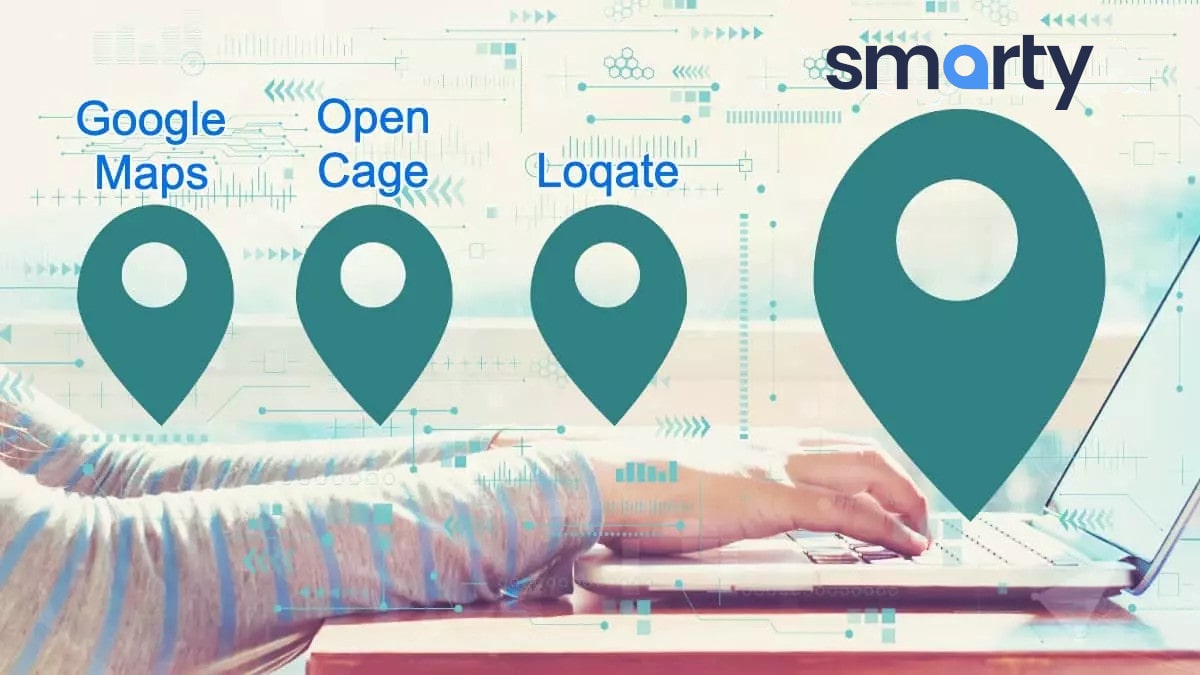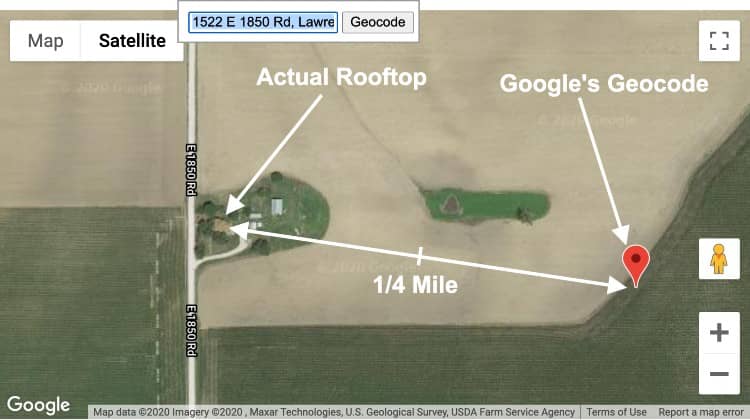Geocoding services | What are some popular options?

Geocoding Services are software programs designed to provide latitude and longitude coordinates (geocodes) for addresses entered by users. Geocoding services vary widely in price, accuracy, speed and the ways in which geocodes are accessed. In this article, we will discuss providers that offer geocoding APIs and batch geocode options.
Here at Smarty, we offer hyper-accurate rooftop geocoding data accessible in several different ways. Try out one of our live APIs and see for yourself.
| Batch Upload Geocoding | Rooftop Geocoding API | Reverse Geocoding API |
|---|---|---|
What's important for you to know is that you have options. We, Smarty, are one of seven services discussed in this article, but that doesn't automatically make us more suited to your needs than Google or Loqate. Whether any geocoding services are the “best” really depends on your needs. So here's a shortlist of some popular names to help you find the latitude and longitude for an address, followed by some more wordy explanations of why they might be a good fit for you.
Popular geocode lookup services include the following:
A quick breakdown of the things we look at:
- Accuracy: How close can the service get you to the bullseye?
- Speed: How long would it take them to turnaround, say, 100,000 requests?
- Address Validation: Do they make sure the geocode matches a real address?
- Maps: Can the service map the geocode for you?
- Limitations: What kind of restrictions does the geocoding provider put on usage?
- Price: They're subject to change over time, obviously, but what can I expect from a given service?
Geocoding services
Now, on to the geocode service providers.
Google Maps geocoding
Google's a pretty big fish to fry. They're a big company with a big name, big clientele, and a big list of features they support. Are they right for you? They might be. Let's look at some highlights of Google Maps Geocoding API:
-
Accuracy: Google generally uses a level of accuracy called “rooftop level,” geocoding for most and “parcel centroid level” for others. The key difficulty, is that Google won’t tell you the accuracy levels of their geocode. They just spit geocodes. If you want to know the accuracy, you have to check it yourself. It is the Schrödinger’s cat of geocodes.
Let’s say we want to geocode the following address:
1522 E 1850 Rd, Lawrence KSGoogle provides us with this geocode:
38.959852, -95.153564Looks good, right? Well, like with Schrödinger’s cat, we don’t know if this geocode is dead or alive until we open the box. Here is that geocode placed on a satellite image:

The geocode that Google provided is actually a quarter mile away from the rooftop. It looks like we opened the box and found the cat dead. Since Google didn’t tell you the geocode was rooftop or parcel centroid you probably would have lost money because you didn’t double-check Google’s work.
- Speed: Non-enterprise accounts are artificially limited to 50 lookups per second. Turnaround time at those limits for a batch—say, 100k requests—is going to be around 33 minutes.
- Validation: Google does not validate addresses. In other words, they don't tell you if an address is real or not before telling you where it is (or where they estimate it would be, if it were real). There is no Google address validation API. As a result, Google cannot provide a ZIP+4 Code for a geocoded address.
- Maps: Here's the obvious one—Google does maps. As in, lots of maps. As a matter of fact, the API suite that the geocoding service is a part of is called “Google Maps for Work,” and there's a long list of features included. The downside? It's all or nothing. More on this on the next line.
- Limitations: The Google geocoding API has a number of restrictions on their service and their data. Two notable ones are the following: First, geocodes from the Google Maps API are only to be used through Google Maps. It's kind of like making a return for in-store credit: yes it's money, but it can only be used there. Second, you're not allowed to keep the geocodes, at least not long-term. You can cache them temporarily, but after that you gotta dump 'em (like that no-good ex of yours). There are other limitations, but these are two of the big ones. You can learn more about these limitations in this Google geocoding API example.
- Price: Google's not cheap. Many users report that they found Google's pricing confusing and far higher than expected when the bill came due. Because we get so many users a month migrating from Google because of price alone, we had to give them $$$$ out of $$$$ dollar signs.
OpenCage geocoding
- Accuracy: OpenCage uses interpolated geocodes—a word which, in this application, means “Maybe accurate enough to meet your needs, but less precise.” Interpolated geocodes are what we call “block level” accurate, and for some, it may be accurate enough.
- Speed: They throttle usage to 40 request per second on their highest priced plan. so even if you're a paying customer it'll take you almost 42 minutes to process 100,000 geocodes.
- Validation: Like Google, they do not validate the addresses that they geocode. So, like Google, the geocode they give back to you may be for a real address, or it may not be.
- Maps: OpenCage doesn't offer mapping.
- Limitations: Usage is largely open and unrestricted (hence “OpenCage”). They even offer a data management service in conjunction with their geocode and mapping services.
- Price: OpenCage only gets $ as it's the lowest price on the list by a landslide.
Loqate geocoding
- Accuracy: If there's a heavyweight in the accuracy corner that can stand up to Google, it's Loqate. Their geocode accuracy is global. The reach and the completeness of their “rooftop level” geocode accuracy can't be overstated; it really is their bread and butter. They're so good, other address validators and geocoders feed off of their database to see if international geocoded addresses are real.
- Speed: Loqate is pretty slim with the information they hand out to the public. They do batch geocode processing, so you don't have to hand in your addresses one at a time. Beyond that, though, if you want to know how snappy their turnaround time is, you'll have to go through their phone tree and get a quote.
- Validation: Loqate does offer address validation, and it's as accurate as their geocodes.
- Maps: They don't offer mapping services.
- Limitations: They've got some, but you have to connect with them to find out what they are. In fact if there is one obvious drawback to their system, it's how aloof and mysterious it is.
- Price: With the highest prices on the list, Loqate comes in with a full $$$$ rating.
TAMU geocoding
- Accuracy: “Rooftop level;” well, “rooftop”-ish. Their geocodes sometimes struggle with issues of reliability.
- Speed: TAMU works a unique, credit-based system where, whether you're a paid user or a free geocoding user, you have to refresh your lookup credits to continue geocoding. It's kind of like putting another quarter into the arcade to keep playing. Only service-level agreements avoid this restriction.
- Validation: TAMU does offer validation, but it's an entirely separate service, complete with its own website. The geocoding website doesn't even link to its sibling site. They do, however, offer address standardization and parsing as part of the geocoding software package.
- Maps: Nope.
- Limitations: TAMU requires a citation and a link to them on any data you display online that they gave you.
- Price: TAMU gets a $.
Melissa geocoding
- Accuracy: Advertised as "Rooftop Geocodes" for 95% of addresses but actually parcel centroid in most cases. With Melissa, the bigger the parcel size you try to geocode, the more obvious that the geocodes don't hit the rooftops.
- Speed: Per their documentation, many things impact your speed. Things like country of input, address quality, server to server travel time, protocol, and load from other users, you can expect to hit a maximum speed of 56 to 140 records per second under optimal conditions. If you want faster with Melissa, you will need an on-premise solution.
- Validation: Address validation is a core product offered by Melissa, so they validate the addresses before they geocode them and standardize them as well.
- Maps: Nope.
- Limitations: No special limitations for Melissa.
- Price: $$ for Melissa
Smarty geocoding
- Accuracy: Geocodes for everywhere on the planet. For the US, geocoding is truly rooftop level accurate. For the rest of the globe, geocode accuracy will be based on what's available for the country in question.
- Speed: We make the Kessel run in under 12 parsecs. Our address validation API is offered in custom, unlimited enterprise plans that hit north of 1,000,000+ records per second in the cloud. If you don't need eyeball melting speed, we still offer unlimited plans that clock in at 250 records per second which is still faster than every other service on the list.
- Validation: Oh goodness, yes. Address validation software is our specialty.
- Maps: Mapping's not our thing but you can map addresses and geocodes using our free QGIS Geocoding Plugin for US Addresses.
- Limitations: None. You paid for the data, so it's yours.
- Price: $$ for us. Our unlimited plans are legendary, offering unlimited lookups per year at 250 lookups per second. We bend over backwards to make your money worth it. We excel at accuracy, speed, support and uptime. We promise you won't be disappointed.
Conclusion
As mentioned above, this list isn't really meant to be exhaustive, either in the geocoding services listed or in the attributes examined. Really, there's no substitute for doing a little door-knocking and finding out what each service has to offer yourself. Still, we hope we were able to give you a head start.
For a more in-depth on alternative geocoding services (as in, “Seriously, get comfortable before settling in to read this one”) look at some of these factors. If you found this article at all helpful, you will likely find the information over there, valuable as well.
Again, though, be warned. Hit the bathroom before you start that road trip.
